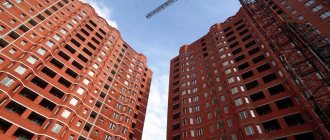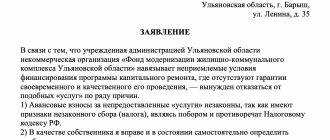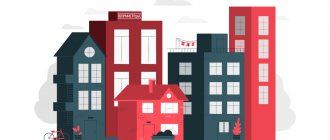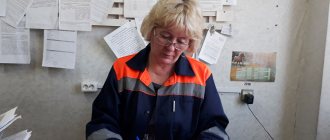In 2014, another “cool” initiative appeared, which, albeit not greatly, but unpleasantly increased the already not the smallest amount in the world for paying for utility services. This wonderful story was called “payment for major repairs.” An entire section IX in the Housing Code of the Russian Federation is dedicated to it.
Art. 169 of the Housing Code of the Russian Federation imperatively obliges each homeowner in an apartment building to pay contributions for major repairs, with the exception of a few cases, but more on that later. Let's start with what it is and how much you need to pay for it.
Who collects contributions for major repairs anyway? And who is responsible for it?
Special regional operators are being created to collect fees for major repairs. A special account is created, a certain limit is set on it (exactly the amount that is necessary to carry out major repair work), upon reaching which (as a rule, it is written on the websites of regional operators, and its achievement is planned for a certain date) the operator begins to finding a contractor to carry out the work.
These same regional operators are responsible for the quality of repairs, as they are the developers of the technical specifications and the final recipients of the work performed.
What is included in the list of overhaul works (Clause 1, Article 166 of the RF Housing Code)?
- Repair of in-house engineering systems of electrical, heat, gas, water supply, drainage;
- repair, replacement, modernization of elevators, repair of elevator shafts, machine and block rooms;
- roof repair;
- repair of basements belonging to common property in an apartment building;
- facade repair;
- repair of the foundation of an apartment building.
Additionally, the law states that a subject of the Russian Federation may supplement the list of overhaul works with services and (or) work under clause 2 of Art. 166 Housing Code of the Russian Federation:
- façade insulation,
- conversion of an unventilated roof to a ventilated roof,
- installation of roof exits,
- installation of automated information and measurement systems for accounting for the consumption of utility resources and utilities,
- installation of collective (common house) meters for the consumption of resources necessary for the provision of public services, and units for managing and regulating the consumption of these resources (heat energy, hot and cold water, electricity, gas) and other types of services and (or) work.
Who can legally refuse to pay contributions for major repairs?
Part 2 Art. 169 of the Housing Code of the Russian Federation tells us that the following have the right not to pay contributions for major repairs:
- Owners whose house is recognized as unsafe in accordance with the procedure established by law
- Owners whose house is subject to seizure for state or municipal needs in accordance with the procedure established by law
Benefits for paying contributions for major repairs are provided (Part 2.1 of Article 169 of the Housing Code of the Russian Federation):
- persons over 80 years old – 100% (do not pay at all)
- persons over 70 years old – 50%.
Beneficiaries to use this norm must be unemployed. All other owners pay contributions for major repairs in full.
If the house is a new building, then residents do not have to pay for major repairs for 5 years from the date of its construction.
It is also important to know that if the housing is not privatized, then major repairs also do not need to be paid for, because the owner of the premises does not live in it, but only uses it.
By the way, in February 2021 there was an interesting situation when the General Prosecutor's Office of the Russian Federation tried to prove the unconstitutionality of fees for major repairs in the Constitutional Court. True, a few days later the letter was withdrawn due to “the need for a more detailed study of the issue.” And many State Duma deputies were indignant about this collection.
How is this area controlled?
Whether your honestly earned hard-earned money is in safe hands, you don’t have to worry. Control over their turnover is carried out by Rosfinmonitoring, the prosecutor's office, and the Accounts Chamber.
If something unexpected happens and the money disappears, the subject will have to replace this capital from his own funds. By the way, the owners of special accounts themselves are required to regularly submit a report to the Housing Inspectorate (once a quarter). Failure to comply with this obligation will result in a fine.
Where can I complain about poorly performed major repairs?
Unfortunately, in Russia this happens all the time. Contributions can be paid regularly, but you will receive an honestly paid overhaul with serious defects.
Regardless of whose fault (unscrupulous performers, or poor quality acceptance) the violations were committed, the regional capital repair operator, who accepts the results of the work, is responsible for the major repairs performed. If something was done wrong, then it should be addressed first.
If you were not heard at first instance, then you need to contact the city administration or the housing inspectorate. The prosecutor's office can also help, including through the online reception (via the Internet).
You can also defend your rights in court. Major repairs are the same as a client-seller relationship, because you pay for major repairs, which means you have every right to quality service.
Where does the money for major repairs go?
Where does the money for major repairs go? That's what they're going for - a major overhaul. But probably what skeptics are most interested in is not even this, but in whose hands the finances go and where they then go. After all, many ordinary people still believe that the government is deceiving them in this way, lining its pockets at the expense of honestly working citizens.
That's funny. All funds raised go to the Capital Repair Fund. You can transfer the payment directly there (regional operator) or to a specially opened bank account - depending on what decision the owners of the premises made at the meeting. All savings will be used to carry out restoration work in your home. Read more about who creates a general and personal account, who is considered the owner and other nuances here.
You need to decide on a mediator a maximum of two months after the program is accepted. If a special account is not allocated, the money will be transferred to the regional operator.
As for the selection of a contractor, it is carried out in accordance with the selection standards of the Capital Repair Fund.
Where does the money go for major home renovations? Contrary to the opinion of legally illiterate ordinary people, money does not go into the “common pot” at all, even if no special account has been opened. The owners replenish the fund only of their own house, not of strangers!
But that's not all. Opening a special account is only the initial stage (how to open a special account for major repairs for owners of apartment buildings?). Owners are obliged:
- negotiate with the bank;
- decide what specific work their home needs most;
- find a contractor, check estimates and accept work;
- insure the account;
- manage money while taking full responsibility for everything they do.
Debits from the account are carried out only in accordance with the minutes of the general meeting.
Well, those who do not want to deal with the repair problem themselves prefer to trust a regional operator.
You can learn more about where contributions for major repairs go, who is required to pay and who is exempt from paying, where it is more profitable to place the fund and other nuances.
How not to make a mistake with a special invoice for major repairs?
Your account, which is always closer to the communal “body”, will help you save up not only for the roof, but also for updating communications, new elevators, facade repairs and much more. If you do everything wisely, you won’t go wrong. In the Omsk region, owners of premises in 1,396 apartment buildings are saving funds for major repairs in a special account. As the regional fund recalled, on March 25, changes to the Law of the Omsk Region No. 1568 “On the organization of major repairs of common property in apartment buildings located in the Omsk Region” came into force. According to the new rules, the period for switching from a general account of a regional operator to a special one is two months instead of the previous four.
A special account, like a general account of a regional operator, has a number of advantages and disadvantages. The advantages lie primarily in the ability to carry out major repairs to the house earlier than it is planned according to the regional program. You can also choose your own contractor. The disadvantages are that you have to keep track of funds, as well as collect debts from defaulters, your own neighbors. You will also have to monitor the progress of the work yourself. How to assess the feasibility of switching from a general account to a special one?
1. Calculate the economic component. Any person can do this. To do this, you just need to multiply the living area of the house by the minimum contribution amount, i.e. 6 rubles 70 kopecks. This will result in the amount that all residents of the house will have to accumulate monthly. From here it is better to immediately exclude possible defaulters. Compare these figures with the cost of major repairs of all structural elements of the house.
2. Think about whether there are active owners in the house who are capable of sensibly monitoring the collection of funds and carrying out major repairs.
If the assessment is positive, you should pay attention to the following recommendations:
1. Spend your money wisely. To do this, you need to assess the condition of the house’s structures and determine the real need for priority work. You should not start investing money on improving the entrances, which can be done using funds for routine repairs or installing a parking lot in front of the house. The money will be spent on minor work, while the roof may deteriorate in just a couple of years, and the elevator may break down.
2. You should not save on project development. Only design specialists will be able to take into account all the nuances and determine the necessary materials for carrying out work in a particular house. For example, to repair a roof worth three million rubles, such work will cost approximately 100 thousand.
3. Responsibly approach the choice of contractor. It is better to be guided by the list approved by the Ministry of Construction and Housing and Communal Services of the Omsk Region, compiled based on the requirements of Decree of the Government of the Russian Federation No. 615 of July 7, 2021. All companies on this list have the necessary certificates, licenses and are necessarily members of an SRO, from whom compensation can be asked in case of dishonesty.
4. Conduct a price examination of the estimated cost. This responsibility can be assigned to the contractor.
5. Specify his warranty obligations in the contract with the contractor.
6. If there are no residents in the house who can qualifiedly accept the work performed, it is better to entrust this to a specialized construction control organization. The cost of such a service for the same roof for three million rubles will be approximately 65 thousand. Also, a management company should be involved in the acceptance of work, which will subsequently have to maintain the repaired structural element.
It is necessary to take into account a number of requirements that are necessary for the formation of a capital repair fund in a special account:
1. According to the Housing Code of the Russian Federation, if the level of collection of funds in the house is less than 50%, it can be returned to the general account of the regional operator.
2. The same procedure threatens those houses where major repairs are not completed within the time period determined by the regional program. And to those houses where the type of work not specified in the regional program was carried out. Owners must notify the Ministry of Construction and Housing and Communal Services of the Omsk Region about all decisions related to changes in the repair period or structural element.
Read more: https://omskregion.info/news/68810-vse_v_dom_kak_omicham_samim_nakopit_na_remont_krsh/ © Information Agency "OMSKREGION"
Where does the tariff for major repairs come from?
The minimum tariff for major repairs is established by a decree of the Government of the subject of the Federation in whose territory the house is located. In the Leningrad Region, the tariff is set by Decree of the Government of the Leningrad Region No. 436 dated November 14, 2018 in the amount of 7.2 rubles per square meter of the total area of residential (non-residential) premises in an apartment building. It's minimum.
If the owners of the house want to set a different tariff, they are obliged to hold a general meeting of owners of an apartment building (MKD), the agenda of which includes the issue of establishing a tariff for major repairs. BUT! In any case, the new tariff cannot be lower than the minimum.
That part of the fund, which is formed by the difference between the minimum and the new tariff, can be used to finance any work (services) for major repairs in the apartment building (clause 3 of Article 166 of the Housing Code of the Russian Federation).
Confiscation of land and distribution of funds
There are cases when a plot of land and the building itself are confiscated for the needs of the state. In this case, all funds that were contributed to the capital repair fund are returned to the participants. Moreover, each of the residents receives these funds in the same amount in which they contributed them to the fund.
The owner of the premises is required to write a statement and indicate his bank details. Documents confirming ownership of the residential premises are attached to the application.
After checking all the papers, the regional operator transfers funds within a month.
If the owner receives a refusal to return the funds, it means that they made mistakes or provided incorrect information. Having corrected them, you can send the application to the regional operator again.
Author of the article
Where to look for information?
In itself, searching for information about your home is not difficult, but since in our discussions the sacramental question still often arises: “Where is the money, ... Zin ...
Fund?”, is not a sin to repeat.
1. The very first step is to go to the website https://www.reformagkh.ru.
2. On the main page, select the “Major renovation of apartment buildings” tab.
3. In the search bar, enter information about the house: region, city, street, house number. On the right is the yellow “Find” button - click.
4. We got to the next page, where in the search bar there is the address of your home, and on the right there is a blue button with the inscription “Search” - click.
5. If this does not produce results, click on the line below (in small print) “advanced search”.
6. Fill in the required fields with the coordinates of your home, and below - again the “Find” button - click.
7. We got to the “Search Results” page and see two columns: “address”, as well as “site section”, and below - two lines: “major repairs” and “my house”. In the first we will find information about the planned period and proposed types of major repairs, in the second - data on the amount accumulated for it and the amount of debt.
Sorry for the perhaps excessive thoroughness - just in case.
Now what to do with this information?
This is where the fun begins. Your apartment building was commissioned, for example, in 2005, and the regional operator has scheduled the first stage of major repairs (yes, it can be carried out more than once), for example, for 2030: replacement of elevators, roof, engineering, etc. It seems normal: the house is considered brand new - we have to wait. Not the children, but the grandchildren will wait.
And it happens that such deadlines are determined for objects whose wear is approaching a critical point. Recent live example. A five-story “Khrushchev” building in the district, a former dormitory with a roof patched up due to current repairs and more or less intact brick walls. The blind area has practically crumbled, the basement is flooded with wastewater from a dilapidated sewerage system, the block foundation is leaking at the seams, adding more groundwater and rainwater to the technical underground. Accordingly, in the ground floor apartments there is irremovable dampness and mold growth. Residents bombard the management company and administration with complaints. The blind area, and even more so the foundation, is definitely a major overhaul. And when?
We search and find: repair of the blind area - 2024-2028, sewerage and foundation - 2039-2043. From a technical point of view, such a sequence, and with such a time spread, is absurd and fiction. Perhaps this is what the long-term regional program intended: to patch up and tidy up the outside of the house as a first approximation, and then, in twenty years, someone else will figure something out. Moreover, 1.3 million rubles were collected from 120 apartments - this will not be enough for a major renovation. And what about the residents, especially on the first floor, how can they spend these years breathing in mold and miasma?








